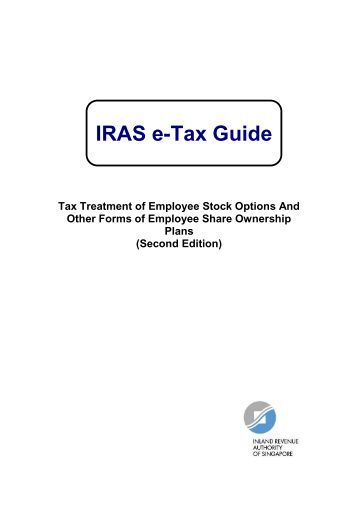Employee share options tax treatment
If you receive an option to buy stock as payment for your services, you may have income when you receive the option, when you exercise the option, or when you dispose of the option or stock received when you exercise the option. There are two types of stock options: Options granted under an employee stock purchase plan or an incentive stock option ISO plan are statutory stock options. Stock options that are granted neither under an employee stock purchase plan nor an ISO plan are nonstatutory stock options.
Refer to Publication , Taxable and Nontaxable Income , for assistance in determining whether you've been granted a statutory or a nonstatutory stock option. If your employer grants you a statutory stock option, you generally don't include any amount in your gross income when you receive or exercise the option.
Taxation of Employee Stock Options - NQs and ISOs
However, you may be subject to alternative minimum tax in the year you exercise an ISO. For more information, refer to the Form Instructions.

You have taxable income or deductible loss when you sell the stock you bought by exercising the option. You generally treat this amount as a capital gain or loss. However, if you don't meet special holding period requirements, you'll have to treat income from the sale as ordinary income.
Non-Qualified Stock Options - TurboTax Tax Tips & Videos
Add these amounts, which are treated as wages, to the basis of the stock in determining the gain or loss on the stock's disposition. Refer to Publication for specific details on the type of stock option, as well as rules for when income is reported and how income is reported for income tax purposes. Incentive Stock Option - After exercising an ISO, you should receive from your employer a Form PDF , Exercise of an Incentive Stock Option Under Section b.
This form will report important dates and values needed to determine the correct amount of capital and ordinary income if applicable to be reported on your return.
Get The Most Out Of Employee Stock Options
Employee Stock Purchase Plan - After your first transfer or sale of stock acquired by exercising an option granted under an employee stock purchase plan, you should receive from your employer a Form PDF , Transfer of Stock Acquired Through an Employee Stock Purchase Plan under Section c.
This form will report important dates and values needed to determine the correct amount of capital and ordinary income to be reported on your return. If your employer grants you a nonstatutory stock option, the amount of income to include and the time to include it depends on whether the fair market value of the option can be readily determined.
Tax Topics - Topic Stock Options
Readily Determined Fair Market Value - If an option is actively traded on an established market, you can readily determine the fair market value of the option.
Refer to Publication for other circumstances under which you can readily determine the fair market value of an option and the rules to determine when you should report income for an option with a readily determinable fair market value.
Not Readily Determined Fair Market Value - Most nonstatutory options don't have a readily determinable fair market value. For nonstatutory options without a readily determinable fair market value, there's no taxable event when the option is granted but you must include in income the fair market value of the stock received on exercise, less the amount paid, when you exercise the option.
You have taxable income or deductible loss when you sell the stock you received by exercising the option. For specific information and reporting requirements, refer to Publication Subscriptions IRS Guidewire IRS Newswire QuickAlerts e-News for Tax Professionals IRS Tax Tips More. Topic - Stock Options If you receive an option to buy stock as payment for your services, you may have income when you receive the option, when you exercise the option, or when you dispose of the option or stock received when you exercise the option.
Statutory Stock Options If your employer grants you a statutory stock option, you generally don't include any amount in your gross income when you receive or exercise the option.
Nonstatutory Stock Options If your employer grants you a nonstatutory stock option, the amount of income to include and the time to include it depends on whether the fair market value of the option can be readily determined. Know Your Rights Taxpayer Bill of Rights Taxpayer Advocate Accessibility Civil Rights Freedom of Information Act No FEAR Act Privacy Policy. Treasury Treasury Inspector General for Tax Administration USA.